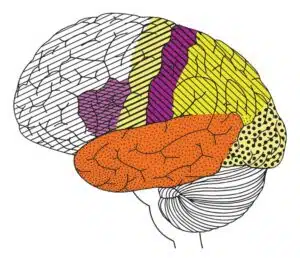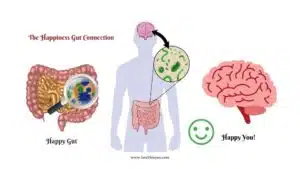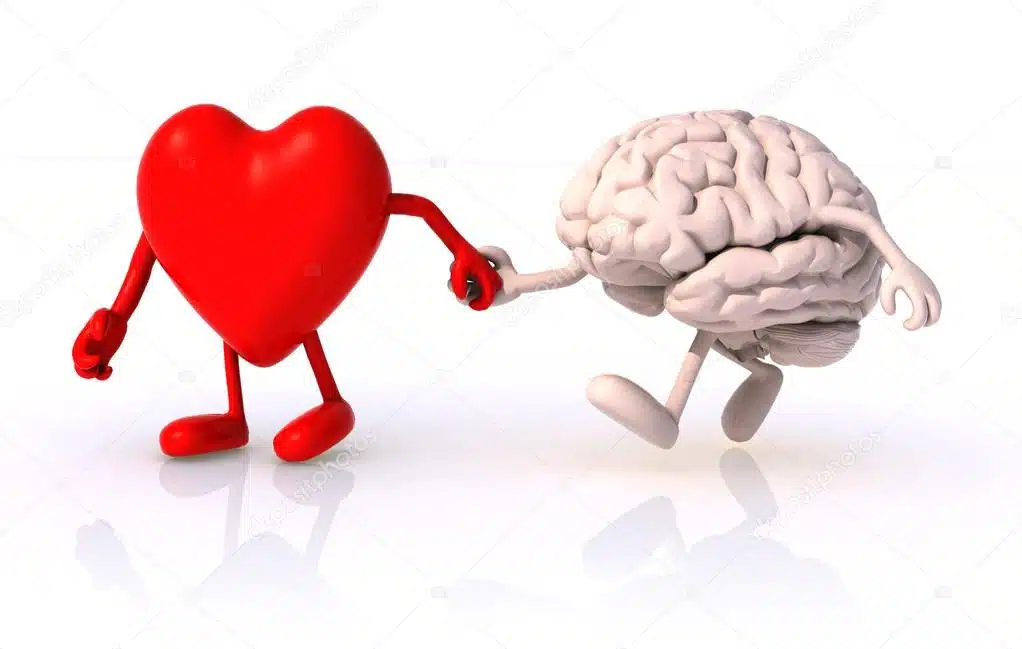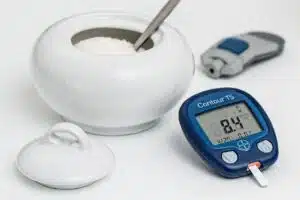Mind over matter? February is designated as American Heart Month! So, let us take care of our heart health. Here are some exciting tips on how to help your brain heal your heart by neurologist Dr. Ayushi Chugh.
The heart is the seat of life. It’s a no-brainer that heart disease is the number one cause of death globally. To raise awareness on how we may optimize our cardiovascular functioning, prevent heart disease, brain problems, stroke, and promote overall health, February is aptly designated as Heart Month by the American Heart Association. However, health awareness isn’t restricted to a particular month or country but is aimed at forging habits worldwide that become an integral part of our life, year-round.
It is well known that elevated blood pressure, blood sugar, cholesterol, and smoking are risk factors for heart disease. Your doctor can help you control these traditional risks. Recent studies reveal that brain connections help combat heart disease and promote overall healthy living. Thus, you yourself can learn to trick your brain into caring for your heart. So, is it mind over matter? Read on.
Background
The cardiovascular system is regulated by the brain in a complex interplay of two parts of the autonomic nervous system – sympathetic & parasympathetic. Ever felt your heart racing before an important interview or sweaty palms watching a horror movie? That’s a manifestation of your sympathetic nervous system at play during our body’s ‘fight and flight’ response. Ever feel sleepy or relaxed after a heavy meal? That’s your parasympathetic nervous system at play during the body’s ‘rest and digest’ state.
Head or the Heart? Better together
Mind over Matter? Head or the Heart? Better together.
Even though our sympathetic nervous system-led ‘fight’ response is vital to our daily challenge-loaded functioning in the world, more and more scientific studies are relaying that such chronic stress, anxiety, depression, and chronic pain involve prolonged activation of the sympathetic system and/or decreased parasympathetic activation.
This, in turn, is harmful to the body in the long run by damaging the lining of (endothelium) and hardening of blood vessels (atherosclerosis), elevating blood pressure, lowering immunity, promoting insulin resistance and diabetes, elevating blood cholesterol, leading to irregular heart rate and rhythm (arrhythmia) and eventually to heart failure. All these are risk factors for stroke and memory impairment.
Some potential parasympathetic mechanisms that promote heart health occur by reducing heart rate, increasing heart rate variability, antiarrhythmic effects, and anti-inflammatory effects by inhibiting cytokine release and preventing tissue and cell damage.

Tips to help your brain trick the heart and body into wellness
The parasympathetic nervous system works via the Vagus or tenth cranial nerve, a.k.a the “wanderer nerve” due to its long path through our body. Originating in the brain, it travels through the neck where it supplies the muscles of swallowing and the voice box (speech, singing), then down to the chest (heart, lungs), and then to the belly and pelvis. This nerve then brings back information to the brain to guide the body to relax.
Parasympathetic systems can be activated by resting and pausing our ‘go-go- mode, enhanced by meditation, yoga, and body massage (mind over matter). If these methods are not feasible in your routine, consider incorporating simple techniques to decompress for a few minutes in your day.
But before you start anything new, always ask your doctor if this is right for you:
1. Box Breathing:
Close your eyes. Imagine drawing a box in the air, each side for a count of four seconds. First, breathe in through your nose for a count of four. Next, hold your breath for another four seconds. Then, exhale through your mouth for a count of four (progress to six), and lastly, pause for four seconds before you take your next breath in. Repeat these steps for at least four minutes daily, more as needed.
2. Belly laugh or sing out loud:
This activates the vagus via voice box and incorporates deep diaphragmatic breathing.
3. Regular sleep routine:
Sleeping at least 7-9 hours a night. Avoid sleep deprivation.
4. Other decompressive methods:
Other decompressive methods such as nature walks, warm baths, light reading, listening to relaxing music, expressing emotions by journaling, art, and before bedtime, writing or acknowledging at least three things that you were grateful for during the day.
How to know if your Autonomic Nervous System is working properly?
At home, using a heart rate monitor, or a smartwatch, you can note your resting heart rate after you wake up from sleep and watch it rise with exertion. There are several computer/ smartphone apps that can measure your heart rate variability throughout the day. The more variable, the better, implying the strength and flexibility of our nervous system.
If clinically indicated, your doctor may refer you to an Autonomic Center where more in-depth tests can be performed.
“G.O-R.E.D” to avoid ‘the blues’!
Remember, your doctor is your health’s best friend. By being an equal and cognizant partner during your health checkups, you can be a stellar patient and help yourself along the way.
The American Heart Association devised an easy acronym to remember these vital goals by the letters “G-O R-E-D”, as elaborated below:
G: Get your numbers
Just as our selfies and snapshots reveal our outer selves, these key metrics are internal snapshots of health and guide risk factors for diseases such as elevated blood pressure, blood sugar, cholesterol, and smoking. It is recommended to at least visit your doctor annually and Get your Numbers.
Here is a quick overview of general goals, which may vary in certain specific conditions:
-Blood Pressure
<120/80mmHg
-Lipid Panel
- Total cholesterol <200mg/dL.
- LDL (low-density lipoprotein/“Bad” Cholesterol): optimal <100mg/dL
- HDL (high-density lipoprotein “Good” Cholesterol): >40mg/dL (Men); >50mg/dL (Women)
- Triglycerides <150mg/dL
– Blood Sugar
- Fasting Glucose <100mg/dL
- HbA1c <7%
-Body Mass Index (BMI)
18.5- 24.9 Kg/ Square meter
-Waist Circumference
< 40 inches (Men), <35 inches (Women)
Ideal weight and glucose levels may vary for certain individuals and health conditions. Discuss with your doctor regarding your health goals.
O: Own your Lifestyle
– Eat Healthily
Scientific data supports that the Mediterranean diet helps prevent heart disease and stroke. Primarily, plant-based with whole grains, beans, vegetables, legumes, fruits, herbs, and spices. Olive oil, nuts, and seeds are rich in monounsaturated fat, which lowers total and LDL cholesterol. Avocados and seafood such as sardines, herring, albacore tuna, and salmon are rich in omega-3 fatty acids which are polyunsaturated fats and help lower triglycerides and fight inflammation, lowering the risk of stroke and heart failure. Dairy and poultry are advised to be used in moderation.
DASH diet or Dietary Approaches to Stop Hypertension aims at lowering or preventing high blood pressure by limiting foods high in sodium, saturated fat, and added sugars. The typical DASH diet limits sodium to 2,300 mg a day, roughly the amount of sodium in 1 teaspoon of table salt. Your doctor can refer you to a nutritionist for more details.
– Avoid
Avoid Smoking, Vaping, and Alcohol
– Exercise
Exercise at least 150 min/week with at least 2 sessions of muscle strengthening exercises. Minimum of 30 minutes of moderate physical activity such as brisk walking, five times a week. Beginners may start low, go slow and build up gradually as tolerated. Always remember to warm up and cool down during workouts.
R: Realize your Risk
Heart disease kills 1 in 3 women! The risk for post-menopausal women is similar to men due to the withdrawal of the protective effect of estrogen.
Also, know that heart attack warning signs in women may be different and less obvious than in men, and beyond typical chest pain, but reveal as nausea, jaw/neck/belly pain, shortness of breath, fainting, or even extreme fatigue.
If you are a man, then take extra special care of the women in your family.
E: Educate your family
Educate your family by setting an example yourself in making healthy food choices and staying active
D: Don’t be silent
Raise awareness, guide others to ask for help and be cognizant. National Wear Red Day is celebrated in the USA on the first Friday of February each year, just a way to encourage everyone to promote heart health, especially women who are often silent sufferers. Any way you choose, or wherever you are, the goal for better health is the same.
So, this Heart Month, indulge in some self-love and take care of yourself as you embark on a year full of possibilities, all while allowing your Mind to help win over Matter.
References
- Parasympathetic Nervous System and Heart Failure. Pathophysiology and Potential Implications for Therapy. Circulation. 2008;118:863–871
- American Heart Association, www.heart.org
- American stroke Association, www.stroke.org
- www.MayoClinic.org

Ayushi Chugh
Related Posts

Fatty Acids, Triacylglycerol, Cholesterol – The Wonders of Fats!

Heart Health Month 2023 – How To Be Heart Healthy this Valentine’s Day









